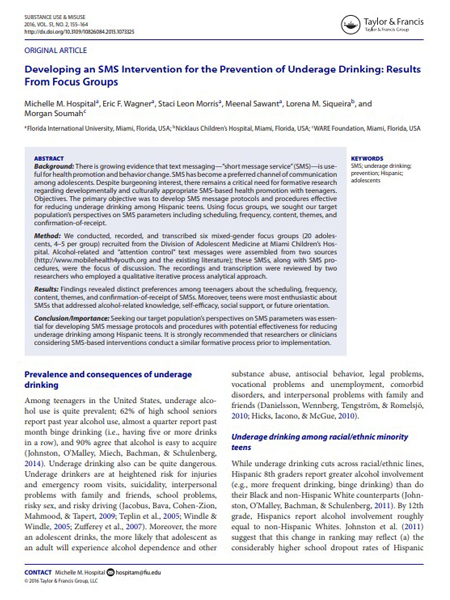Developing an SMS intervention for the prevention of underage drinking: Results from focus groups
 Abstract: Background- There is growing evidence that text messaging-“short message service” (SMS)-is useful for health promotion and behavior change. SMS has become a preferred channel of communication among adolescents. Despite burgeoning interest, there remains a critical need for formative research regarding developmentally and culturally appropriate SMS-based health promotion with teenagers.
Abstract: Background- There is growing evidence that text messaging-“short message service” (SMS)-is useful for health promotion and behavior change. SMS has become a preferred channel of communication among adolescents. Despite burgeoning interest, there remains a critical need for formative research regarding developmentally and culturally appropriate SMS-based health promotion with teenagers.
Objectives: The primary objective was to develop SMS message protocols and procedures effective for reducing underage drinking among Hispanic teens. Using focus groups, we sought our target population’s perspectives on SMS parameters including scheduling, frequency, content, themes, and confirmation-of-receipt.
Method: We conducted, recorded, and transcribed six mixed-gender focus groups (20 adolescents, 4-5 per group) recruited from the Division of Adolescent Medicine at Miami Children’s Hospital. Alcohol-related and “attention control” text messages were assembled from two sources (http://www.mobilehealth4youth.org and the existing literature); these SMSs, along with SMS procedures, were the focus of discussion. The recordings and transcription were reviewed by two researchers who employed a qualitative iterative process analytical approach.
Results: Findings revealed distinct preferences among teenagers about the scheduling, frequency, content, themes, and confirmation-of-receipt of SMSs. Moreover, teens were most enthusiastic about SMSs that addressed alcohol-related knowledge, self-efficacy, social support, or future orientation.
Conclusion/Importance: Seeking our target population’s perspectives on SMS parameters was essential for developing SMS message protocols and procedures with potential effectiveness for reducing underage drinking among Hispanic teens. It is strongly recommended that researchers or clinicians considering SMS-based interventions conduct a similar formative process prior to implementation.
Hospital, M.M., Wagner, E.F., Morris, S.L., Sawant, M., Siqueira, L.M., & Soumah, M. (2016). Developing an SMS intervention for the prevention of underage drinking: Results from focus groups. Substance Use & Misuse, 51(2), 155-164. doi:10.3109/10826084.2015.1073325
